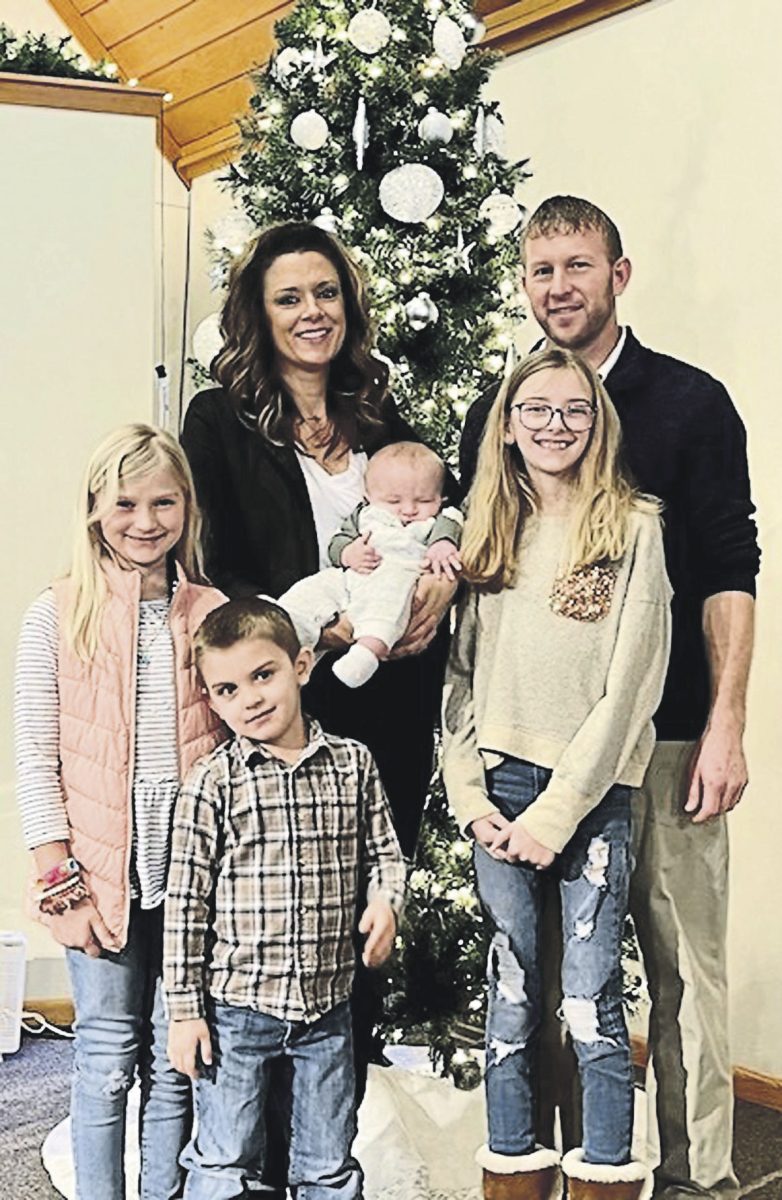At 10:30 p.m. one February night, Amy Hammen took off for Storm Lake after reading a news story on Facebook — her infant son’s formula was being recalled.
It was late and a 20-mile drive.
“Living in kind of a more rural area, there’s not a lot of places,” said Hammen, whose family lives and farms near Fonda. “My husband was kind of like, ‘Why are you going to Storm Lake at 10:30 at night?’ I was like, ‘’Cause I don’t know what the shelves are going to look like tomorrow morning, and I don’t want to be scouring the county for formula to feed him.’”
When Hammen reached the Walmart in Storm Lake, there was only one canister of her son’s formula, Similac Pro-Advance.
Like Hammen, some Iowa parents and caregivers are still scrambling to find safe milk for their babies. The supply of infant formula was already tight when the voluntary recall by Abbott Nutrition, which manufactures Similac, was announced Feb. 17, the night Hammen read the news story on social media.
Parents are also watching for signs of a rare but serious bacterial infection from potentially contaminated formula at a time when health anxiety is already high.
As of Feb. 28, at least five U.S. infants had been hospitalized after consuming Abbott Nutrition products believed to contain Cronobacter sakazakii or Salmonella Newport, bacteria that can be lethal in young infants or babies with pre-existing health problems. Two of those infants have died.
In Iowa, Sarah Ekstrand of the Iowa Department of Public Health, said on March 3 that 70,000 containers of the initially recalled product had been distributed by Women, Infants & Children (WIC) program in Iowa.
Changes made quickly by Iowa WIC program officials and the U.S. Department of Agriculture enabled families to exchange recalled cans of formula for brands that weren’t recalled at stores like Hy-Vee and Fareway.
In Storm Lake, it wasn’t unusual to see lean offerings on the Walmart shelves, said Hammen. Her son, Isaac, was born in August, and the formula shelves have never been fully stocked, a pandemic-related shortage that she didn’t experience with her three older children.
The Walmart employees didn’t know about the recall, Hammen said. She gave the employees the lone can of recalled Similac Pro-Advance and then purchased a comparable off-brand of formula for her son.
The 6-month-old didn’t respond well, she said.
“He wasn’t napping well, and he was extremely fussy and didn’t want to drink his bottles anymore,” Hammen said. “It’s hard. It’s not like when there’s a chicken shortage or cream cheese shortage, you can switch to something else for us to eat. This is their only food.”
The recall, which was expanded Feb. 28, involves powdered formula manufactured at an Abbott Nutrition facility in Sturgis, Michigan. The second infant who died had been fed Similac PM 60/40, which was not part of the previous recall.
Iowa has no confirmed cases of illness associated with the formula recall, IDPH spokeswoman Sarah Ekstrand said in an email on March 3.
Information to help caregivers determine whether their formula is subject to the recall is available at similacrecall.com. They can also call 800-986-8540 for help.
Dr. Abigail Allard, a pediatrician at Broadlawns Medical Center in Des Moines, said she and her Broadlawns colleagues have not seen or treated any children who developed bacterial infections because of contaminated formula.
Allard emphasized that the infections are “very rare,” but that parents should remain attentive to their child’s symptoms if the child has consumed one of the recalled formulas recently.
“If they’re going to make you sick, they’re going to usually start with fever, diarrhea, just lethargy – big changes in a kid’s normal activity level. Whereas a baby might wake up to feed, they don’t wake up to feed. Or they’re vigorous when you put a wet wipe on their bum to change them, they don’t really respond. Those are concerning signs to go to the ER,” Allard said.
The recall has been especially hard on low-income families and foster parents who receive formula from WIC (Women, Infants & Children), a federal nutrition program that provides food and other services to pregnant women and children younger than age 5.
Caregivers have peppered pediatricians with lots of questions since the recall began, Allard said. Many families at Broadlawns speak little or no English, and many receive WIC benefits.
Switching formula brands is safe and healthy, although some children will have a change in bowel habits, Allard said.
“It depends on the child, if they’re going to be sensitive to one (formula) and not the other,” Allard said. “If you do need to switch, I would recommend going halfsies. If you have a little Similac left and you have to switch to Enfamil, do half Similac, half Enfamil for a couple bottles to slowly get their stomachs introduced. But when we’re getting down to basic needs, formula is formula, and it’s important just to be fed.”
In Iowa, the WIC program is administered by the Iowa Department of Public Health.
Ekstrand, the Iowa Department of Public Health spokeswoman, said in an email on Feb. 28 that “the supply of alternate formulas for WIC program families is stable.”
During a phone call with IowaWatch, Ekstrand said that “our WIC hotline has received a lot of phone calls asking for help and assistance in finding formula and replacing formula.”
Still, some families struggled.
“What I’m finding as time has gone on is that the shelves are bare,” said Allard, the Broadlawns pediatrician. “People did that snowstorm shopping kind of thing with the formula. Like, ‘Oh my gosh, it got recalled, I need to get it.’ And the shelves are getting emptied, which is a concern. They’re getting emptied of the Similac.”
After the initial recall was announced, worried parents exchanged tips for finding safe formula in closed Facebook groups for moms. Some moms offered to donate their own breast milk or unrecalled formula.
Others shared old formula recipes that included ingredients such as Karo syrup and evaporated milk or goat’s milk, a practice that health experts strongly discourage in part because of concern about whether infants would get sufficient vitamins and minerals.
“The infant’s kidneys are not prepared to handle goat’s milk or some Karo syrup recipe off the internet,” Allard said.
Some grassroots groups decided to purchase non-recalled formula themselves to distribute to parents and caregivers in need.
Ventica Woods of Urbandale is one of four young women who formed Sister Queenz when the COVID-19 pandemic hit in spring 2020. The group’s goal is to help single parents and children in need, as well as the greater community.
Woods said that her baby is breastfed, but that she used formula to feed her older child. She could relate to the parents searching for non-recalled formula.
“Formula is so expensive. It doesn’t make sense that these parents would be out of meals for their babies. We know how it is, as a parent, not knowing where your child’s next meal is going to come from, so we all decided to chip in and buy as much as we can afford,” Woods said.
Cindy McCarthy, the food pantry manager at Waukee Area Christian Services in Waukee, said the formula recall hit as families were already struggling with higher prices at the grocery store and a recent reduction to their SNAP benefits.
“The families that are coming in are having a more difficult time with finances,” McCarthy said.
The formula that the food pantry stocks is mostly donated by members of the community, although the pantry receives some from an Iowa WIC office occasionally and from food recovery via Costco.
McCarthy said that her food pantry volunteers had to throw out 30 canisters of recalled baby formula.
She said the food pantry continues to see a couple new families every week, and that many people are struggling to buy groceries right now.
“There’s just a lot of need,” McCarthy said.
McCarthy said that the pantry will continue to accept donations of non-recalled formula, and that volunteers always check the formula’s expiration dates and whether it has been recalled.
Nicole Grundmeier is a freelance reporter and writer for IowaWatch. She has previously worked as a reporter and copy editor for The Des Moines Register. She earned a bachelor’s degree in journalism and mass communication from Iowa State University and a master’s degree in journalism from Northwestern University.
This story was produced by the Iowa Center for Public Affairs Journalism-IowaWatch, a non-profit, online news website that collaborates with news organizations to produce explanatory and investigative reporting. Read more at www.IowaWatch.org.
‘This is their only food’: Formula recall forces Iowa families to adapt
Nicole Grundmeier
IowaWatch
March 10, 2022
Amy Hammen and her family live and farm in rural Fonda, Iowa. Her 6-month-old son’s Similac Pro-Advance formula was part of the recent recall in early 2022. Her son struggled with the off-brand formula she then purchased.

